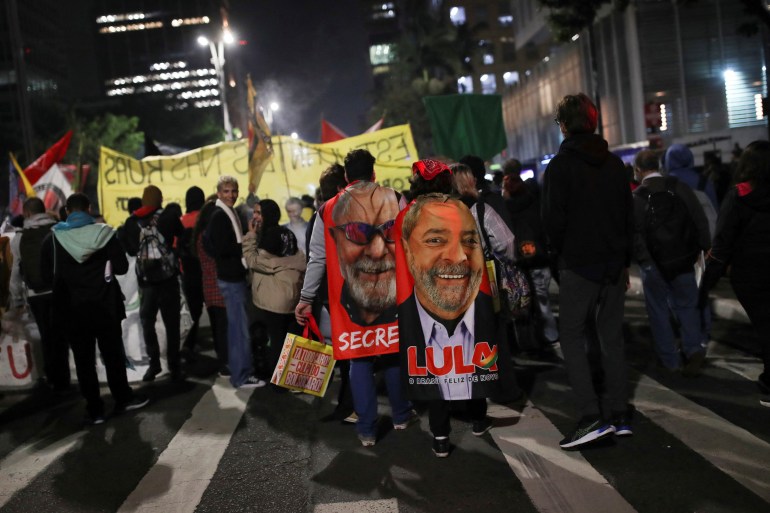Lula holds lead as Brazil’s election campaign officially begins
Polarised presidential campaign kicks off with former left-wing leader holding 12-percent lead over Jair Bolsonaro.

Brazil’s former left-wing President Luiz Inacio Lula da Silva holds a double-digit lead over far-right incumbent Jair Bolsonaro, a new poll has shown, as the country’s tightly contested presidential election campaign officially kicks off.
Bolsonaro and Lula, who have in reality been on the campaign trail for months, held rival events on Tuesday in what experts say is one of the most polarised campaigns in decades.
Keep reading
list of 3 itemsFacebook misses election disinformation ads in Brazil: Report
Brazilians protest for democracy as Bolsonaro threatens election
The 67-year-old Bolsonaro launched his re-election campaign with a rally in Juiz de Fora, the small southeastern city where an attacker stabbed and nearly killed him during the 2018 campaign that he won.
“It’s impossible not to be moved, returning to this city,” Bolsonaro told the crowd, as people were patted down before being allowed past metal barriers to approach the president’s stage. “The memory that I carry with me is of a rebirth. My life was spared by our creator.”
Meanwhile, Lula, 76, started his bid for the presidency with a visit to a Volkswagen plant in Sao Bernardo do Campo, in the industrial heartland of Sao Paulo state, where he launched his political career as a union leader.
He rattled off the Bolsonaro administration’s failings during the COVID-19 pandemic — which a Senate investigation found contributed to the world’s second-highest death toll — then said, “If there’s anyone possessed by the devil, it’s that Bolsonaro.”
The election on October 2 will be the first since Bolsonaro – a far-right former army captain who has seen his popularity plummet during the coronavirus crisis – came to power four years ago.
Fears of political violence should the results be contested are rising, as Bolsonaro without evidence has claimed for months that the country’s electronic voting system is vulnerable to fraud – an allegation rejected by legal experts.
The race is “the most polarising … since the return to democracy” in Brazil in the late 1980s, said political analyst Adriano Laureno of consulting firm Prospectiva.
“Bolsonaro has tried to build this narrative of divine selection around his presidency … in which surviving the stabbing incident plays a central role,” Laureno told the AFP news agency. “Lula meanwhile always looks to return to Sao Bernardo at key moments in his political trajectory, casting himself as a man of the people.”
A survey by IPEC, formerly known as IBOPE, on Monday showed Lula with 44 percent of voter support compared to 32 percent for Bolsonaro in the first round of the election.
In an expected runoff between the two men on October 30, should no candidate win 50 percent plus one of the valid votes, Lula would get elected with 51 percent versus 35 percent for Bolsonaro, a 16-point gap, the poll showed.

That advantage for the left-wing former president is mirrored by other polls, which have shown the presidential race narrowing in recent weeks.
Lula’s lead has fallen from 26 percent in December to 18 percent in July, according to Datafolha, another major polling firm, but Lula still had a 20 percent lead over Bolsonaro should the pair face off in a runoff.
Bolsonaro has increased spending on welfare for poor Brazilians, which may be improving his numbers. He has also pressed state-controlled oil company Petrobras to lower the price of fuel, a big factor in pushing up inflation.
For his part, Lula – who served as president between 2003 and 2010 – has called on Brazilians to elect him to help “rebuild and transform Brazil” and defend the country against a “totalitarian threat”.
Lula left office as the most popular president in Brazilian history, after presiding over an economic boom that helped lift approximately 30 million people out of poverty, but he fell from grace when he became a target in a massive corruption probe dubbed “Operation Car Wash”.
Lula, who denies any wrongdoing, has called the case a trumped-up bid to topple his legacy, and a judge last year annulled his criminal convictions, opening the door for his re-election campaign.
Al Jazeera’s Monica Yanakiew, reporting from Rio de Janeiro on Tuesday, said Lula and Bolsonaro “represent two extremes of Brazilian politics”, with both candidates having a strong core of supporters as well as their fair share of critics.
“The economy is going to be the main issue because we’re right now facing inflation – one of the highest [rates] in recent history – and unemployment and all the other problems that came with the pandemic and the war in Ukraine,” Yanakiew said.
